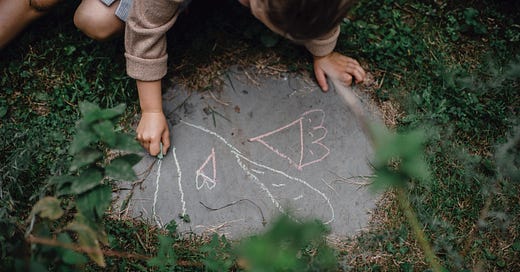What's a "natural talent"?
"Natural talents" encompass way more than you might expect, and understanding the different ways they can peek through is empowering and exciting.
The focus of the Get a Direction method for choosing a college major is centered on two core ideas:
1) Your child's Demonstrated Natural Aptitudes (DNA), AKA their "natural talents," are inherent to them. It's woven into their design—the very fabric of their being. You could say they "just come naturally," and sometimes they emerge in surprising or unexpected ways.
2) Helping your child define what would be a meaningful outcome of their work is key to helping them choose a college major that will prepare them for the kind of work they will find personally fulfilling. In a counseling session, I help students define their HIHO, or "How I Help Others." In the Get a Direction method, we find the areas where their DNA and HIHO overlap, and in that space is where we can drill down on the perfect major(s) for them to consider.
I will write more about HIHOs in another post, but for now, let's take a step back:
What comes to mind when I say "natural talent"?
It's easy to only think of the obvious natural talents that we as a society notice and value, like:
"She's a natural painter."
"He's so good at sports."
"What an amazing actor!"
"She's really got a head for numbers."
All of these talents are valid, but we can go much deeper. What's more, our kids (all people, really!) have so much more than one or two natural talents, and the possible combinations of natural talents each child possesses, plus the unique ways they choose to express those talents, means each child is an amazing, wholly unique design.
Other examples of natural talents, that you might not have realized were natural talents.
Perhaps your kid is the one who:
Easily figures out patterns in systems.
Knows how to organize ideas in a cohesive and fascinating new ways.
Loves to create new businesses for fun.
Forecasts and predict trends in fashion, numbers, politcs, etc.
Can organize people and lead them to accomplish a group goal.
Sifts through spreadsheets, graphs, or code to understand the human story behind the numbers.
Imagines and then creates structures, products, clothing, patterns, fantasy worlds using 3D modeling, sketches, wordsmithing, etc.
Is able to find shapes and patterns in everyday objects.
Figures out the most diplomatic, peaceful way to resolve conflicts amongst friends, in school government, at their work, and more.
Enjoys the challenge of working within rules and regulations to create something new.
Discerns the best way to teach someone a new skill or piece of knowledge.
Natural talents are strengths that can shine through in diverse situations. They may or may not be obvious, or have a defined name, and you might be surprised in the ways they can show up.
For example, your child's natural teaching aptitude might peek out when they're suggesting a better way to design a user-friendly app, or write a clearer sentence, or even constructing a simpler system for a machine.
With their natural ability to consider how others might struggle to grasp new info, and then distilling the knowledge into bite-sized pieces for easier comprehension, a child with a natural teaching aptitude might have multiple ways to apply their talent.
Natural talents can appear in many forms, and emerge all on their own. They can be strengthened, but rarely require being taught.
In the next article, I'll be discussing the difference between a "natural talent" and an "acquired skill," why acquired skills are just as valuable and important as natural talents, and also the potential hazards of your child pursuing a career that utilizes only their acquired skills, and few to none of their natural talents.
Comment below with your questions and insights. I will do my best to personally respond to each post!




